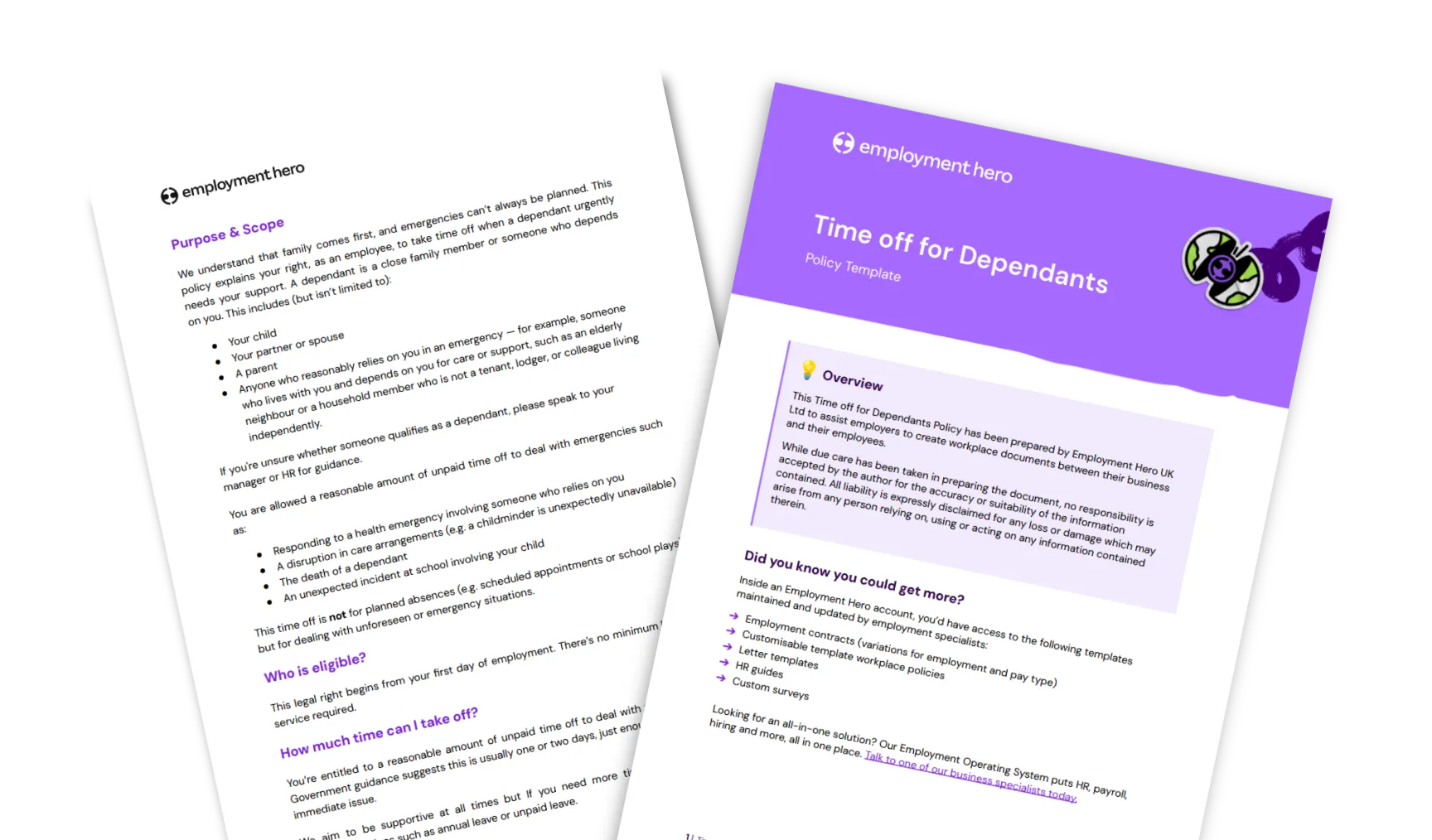Part time workers rights: Employer’s guide
-

Stefanie le Roux

Contents
Managing people is never just about rotas, payroll and the occasional team lunch. It’s also about understanding the rights that protect your employees, whether they’re clocking in two days a week or working reduced hours alongside family commitments.
Part-time workers make up a huge part of the UK workforce, and if you get their rights wrong, you risk more than a letter from ACAS. You could damage trust, morale and even your reputation as an employer.
This guide is here to help Human Resources (HR) teams and Small-to-Medium Enterprise (SME) leaders navigate the essentials of part-time employment rights, so you can manage compliance, keep things fair and build a workplace people actually want to be part of.
What qualifies as a part-time worker in the UK?
A part-time worker is anyone who works fewer hours than a comparable full-time employee in your business. According to Gov.uk and ACAS, there is no strict threshold for what counts as “part-time”. It could be someone working 30 hours a week in a retail role, or someone contracted for two short shifts a week in hospitality.
In SMEs, typical part-time roles often include shop assistants, receptionists, administrative support roles, hospitality staff, and increasingly, professional roles like accountants or marketers working reduced hours. The key point is that their terms and conditions can’t be less favourable just because they work fewer hours.
Core employment rights for part-time workers
The Part-time Workers (Prevention of Less Favourable Treatment) Regulations 2000 ensure that part-time staff are protected from discrimination. In plain terms, if a full-time employee is entitled to a benefit, training opportunity, or fair rate of pay, so is their part-time counterpart, pro rata.
Part-time staff must be paid the same hourly rate as full-time staff doing the same job. This principle extends beyond basic wages to include overtime rates, shift premiums and performance-related pay. Annual leave, parental leave and sick pay apply on a pro-rata basis, ensuring that reduced hours don’t mean reduced rights.
From pension contributions to staff discounts, benefits must not be withheld simply because someone works fewer hours. Employers must also ensure equal access to development opportunities, meaning training courses, mentoring programmes and promotion opportunities should be available to all staff regardless of their contracted hours.
Less favourable treatment is unlawful. If a full-time employee gets an annual bonus, the part-time employee should receive the equivalent proportion, based on hours worked.
Holiday entitlement for part-time workers
Holiday entitlement can be tricky, particularly when bank holidays come into play. The UK statutory minimum is 5.6 weeks’ paid holiday per year. For part-time staff, this is calculated pro rata according to the number of days or hours worked.
|
Working Pattern |
Calculation |
Holiday Entitlement |
|---|---|---|
|
Full-time (5 days/week) |
Base entitlement |
28 days |
|
3 days/week |
3 ÷ 5 × 28 |
16.8 days |
|
2 days/week |
2 ÷ 5 × 28 |
11.2 days |
|
20 hours/week (vs 40 full-time) |
20 ÷ 40 × 28 |
14 days |
Bank holidays can cause confusion, especially if your business usually closes on those days. The law does not require employers to give bank holidays as paid leave, but part-time workers must not be treated less favourably. Offering pro rata bank holiday entitlement is the fairest approach.
Sick pay, parental leave and other leave rights
Part-time workers may be eligible for Statutory Sick Pay (SSP) if they meet the qualifying criteria, which includes earning at least the Lower Earnings Limit (£125 per week in 2025). SSP is paid for up to 28 weeks and is not reduced simply because the employee works part-time.
|
Leave Type |
Part-time Entitlement |
Key Considerations |
|---|---|---|
|
Statutory Sick Pay |
Same rate as full-time (if eligible) |
Must earn £125+ per week |
|
Maternity Leave |
52 weeks (same as full-time) |
Pay calculated on average weekly earnings |
|
Paternity Leave |
2 weeks (same as full-time) |
Pay based on earnings, not hours |
|
Shared Parental Leave |
Up to 50 weeks (same as full-time) |
Can be shared between eligible parents |
Parental leave entitlements, including maternity, paternity and adoption leave, apply equally to part-time workers. The difference is in pay, which is calculated on average weekly earnings. A part-time worker earning less will receive lower statutory pay, but the right to time off remains the same.
Other statutory leave, such as shared parental leave or time off for dependants, must also be applied fairly to part-time contracts.
Pension rights for part-time staff
Auto-enrolment duties apply to eligible part-time staff in the same way as full-time employees. If they are aged between 22 and State Pension Age, and earn more than £10,000 per year from your business, they must be automatically enrolled in a workplace pension.
Even if they earn less than £10,000 but more than £6,240, part-time employees can opt in to receive employer contributions. As an employer, your responsibilities for pension contributions remain consistent regardless of the employee’s hours.
Redundancy rights for part-time employees
Redundancy is never easy, but part-time workers must not be disadvantaged in the process. Redundancy pay calculations follow the same statutory formula for part-time staff as full-time employees, based on their actual weekly pay and length of service. This means a part-time employee with the same length of service as a full-time colleague will receive proportionally fair compensation.
Choosing employees for redundancy based on working hours alone is discriminatory and unlawful, as is any selection criteria that disproportionately affects part-time workers. The consultation process, notice periods and appeal rights all apply to part-time staff in exactly the same way as their full-time peers, ensuring fair treatment throughout what is already a difficult process.
Zero-hours contracts and part-time workers
Many part-time workers in retail, hospitality and care sectors work on zero-hours contracts. While these contracts offer flexibility, they come with specific considerations that differ from traditional part-time contracts.
Zero-hours workers still have the right to the National Minimum Wage, holiday pay calculated on hours actually worked and protection from less favourable treatment compared to permanent staff doing similar work.
Since 2015, exclusivity clauses in zero-hours contracts have been banned, meaning workers can seek employment elsewhere. However, employers are not obligated to provide minimum hours, and workers are not required to accept shifts offered.
The key difference lies in holiday pay calculations. For zero-hours workers, holiday pay should be calculated using the average of the previous 52 weeks of earnings, including only weeks where they actually worked and earned money.
Managing different contract types
Part-time workers don’t all fall into the same category, and understanding these distinctions is crucial for compliance.
|
Contract Type |
Key Rights |
Employer Considerations |
|---|---|---|
|
Permanent part-time |
Full employment rights, pro rata |
Standard contracts and policies apply |
|
Fixed-term part-time |
Same rights as permanent |
Must justify different treatment vs permanent staff |
|
Agency workers |
Equal treatment after 12 weeks |
Complex pay and holiday calculations |
|
Casual workers |
Basic employment rights |
Often confused with zero-hours contracts |
Agency workers gain the right to equal treatment with permanent staff after 12 weeks in the same role, including basic pay, holiday entitlement and access to facilities. Fixed-term part-time workers have the same rights as permanent employees and cannot be treated less favourably simply because their contract has an end date.
Right to request flexible working
From April 2024, all employees have the right to request flexible working from day one of employment, not after 26 weeks as previously required. This has significant implications for part-time workers who may want to adjust their patterns.
Employees can make two requests per year, and employers must respond within two months. The eight business reasons for refusal remain, including burden of additional costs, inability to reorganise work among existing staff and detrimental impact on performance. However, employers must consider each request properly and cannot dismiss them without genuine consideration.
For part-time workers, common flexible working requests include:
- Changing days worked
- Adjusting start and finish times
- Moving between different locations.
Employers should have a clear policy and handle all requests consistently.
Performance management for part-time staff
Managing performance fairly across different working patterns takes a bit of thought, but it doesn’t have to be complicated. Part-time employees deserve the same structured approach to performance as their full-time team members, with clear objectives, regular check-ins and opportunities to grow.
The tricky part is usually scheduling. Reviews and one-to-ones should happen within an employee’s contracted hours. If that’s not possible, employers should consider paying for any extra time spent in meetings. Just as importantly, objectives need to be proportionate to the hours worked. Setting full-time targets for part-time staff would be unfair, and sets everyone up for frustration.
Documentation can be your best friend here. Because part-time hours often mean less day-to-day contact, informal feedback might slip through the cracks. Keeping records of progress, achievements and development conversations ensures consistency and means no one feels overlooked.
When part-time workers have multiple jobs
More people are choosing to balance multiple part-time roles, and this can raise a few questions for employers. The good news is, most of the rules are straightforward once you know them.
Holiday entitlement is calculated separately for each job. As an employer, you’re only responsible for holiday pay based on the work done for you, not for any other employer. You also can’t ban someone from taking a second role unless it genuinely conflicts with your business interests or breaches their contract.
Statutory leave works in a similar way. If an employee qualifies for maternity, paternity or adoption pay in more than one job, they’re entitled to receive it from each employer. There are overall caps on statutory pay, but the entitlement itself is separate.
The main thing to focus on is communication. Make sure your employee’s working patterns are clear and manageable so they can meet their commitments to you without burning out. A little flexibility and understanding here can go a long way in building trust.
Record keeping and evidence requirements
If there’s one thing tribunals love, it’s paperwork. And if there’s one thing that keeps employers out of trouble, it’s also paperwork. Keeping accurate, consistent records is essential for showing your employees that you’re treating them fairly.
The essentials include:
- Payroll data showing hourly rates and calculations
- Training attendance records for all staff (not just the full-timers)
- A clear log of flexible working requests and decisions.
It’s also wise to keep copies of all communications around terms and conditions, policy changes and consultation notes. That way, if a question ever arises, you’ve got a full trail to refer back to.
Holiday pay is a common sticking point. For part-time or irregular hours staff, accurate records of hours worked across rolling 52-week periods are key. When disputes arise, the first thing an employment tribunal will look at is your data. If you can show consistency, accuracy and transparency, you’re in a far stronger position.
If this all sounds like a lot of admin, it is. But HR software that tracks entitlements automatically can take the sting out of it, reducing both your workload and the risk of human error. If you’re looking for a good place to start, Employment Hero’s HR software can help you manage your team from onboarding to offboarding.
Common employer mistakes and how to avoid them
Even the most well-intentioned SME employers can stumble into the same pitfalls when managing part-time staff. Here are some of the big ones to watch out for:
- Loading part-timers with unsociable shifts. If your part-time employees always end up with the Friday night or Sunday morning slots, while full-timers enjoy the nine-to-five, that could be seen as less favourable treatment.
- Leaving part-time staff out of the loop. “We didn’t invite you to the meeting because you’re not usually in on that day” can still be seen as unfair treatment. Important meetings should be scheduled during core hours where possible, or at least backed up with recordings and summaries.
- Guessing holiday pay. Rounding up, rounding down or using “rough estimates” for holiday entitlement can lead to underpayment claims. Proper calculations based on actual hours worked are non-negotiable.
- Assuming less commitment. A part-time worker may only be with you three days a week, but that doesn’t mean they’re less interested in training or promotion. In fact, overlooking them for progression can lead to both legal trouble and morale issues.
Cost considerations and business benefits
Tribunal awards for part-time discrimination can run into thousands, not to mention legal fees and reputational damage. Prevention through clear policies, training and good record-keeping is always cheaper than firefighting after the fact.
On the flip side, fairly treated part-time staff are more likely to stay. And high retention means lower recruitment costs and stronger team continuity.
By offering part-time roles, you also open up your business to a wider talent pool, including skilled professionals who need flexibility, parents returning to work, and people bringing diverse experiences from multiple jobs.
Discrimination risks specific to part-time work
Part-time work often intersects with the equality law. Because three-quarters of part-time workers in the UK are women, less favourable treatment often amounts to indirect sex discrimination. That includes overlooking progression opportunities, limiting training access or refusing requests to return part-time after maternity leave.
Disability-related adjustments are another area to watch. Part-time arrangements are often part of reasonable adjustments, and treating someone less favourably because of this is unlawful.
Age assumptions can also creep in, with part-time roles stereotyped as being for students or for people easing into retirement. In reality, part-time work spans all career stages.
Preventing less favourable treatment
Direct discrimination is obvious, like denying training to a part-time employee because they’re not full-time. Indirect discrimination is subtler, such as scheduling mandatory team sessions when you know half your part-time team isn’t contracted to be there.
Tribunals don’t look kindly on either form of discrimination. The safest approach, and most ethical, is to treat them as core team members, with equal access to opportunities. Flexible working requests should always go through the correct statutory process, with decisions documented clearly.
Best practices for employers managing part-time staff
Make sure contracts and policies are watertight, with entitlements and expectations set out clearly. Share shifts fairly, rather than loading part-time staff with unpopular hours. Keep them in the loop with team updates, meetings and social activities.
Even small things make a big difference. Recording a meeting so someone can catch up later, or planning training during core hours, shows respect and helps part-time staff feel integrated. And that sense of belonging is what keeps people motivated.
How can Employment Hero help?
From retail staff to finance managers, part-time employees bring flexibility and talent to SMEs.
If you are unsure about your obligations, now is the time to review your contracts, policies and HR practices. Our HR advisory team can provide support, and we also offer templates and checklists to help you stay up to date on compliance with UK employment law.
FAQs about part-time employment rights
Yes. If a bonus is contractual or discretionary, part-time employees must receive it on a pro-rata basis. Withholding it simply because they work fewer hours would be unlawful.
No. Part-time workers have the right to equal access to training and career development opportunities. Excluding them could be classed as less favourable treatment.
Holiday entitlement and pay should be based on average weekly hours worked, typically calculated over a 52-week reference period.
Related Resources
-
 Read more: Notice of termination of employment UK
Read more: Notice of termination of employment UKNotice of termination of employment UK
Need to issue or respond to a notice of termination of employment? Use our employer-focused checklist covering notice periods, resignation…
-
 Read more: Time off for dependants: A guide to dependency leave
Read more: Time off for dependants: A guide to dependency leaveTime off for dependants: A guide to dependency leave
Dependency leave gives employees time off to care for dependants during emergencies. Learn more about your employer responsibilities in this…




















